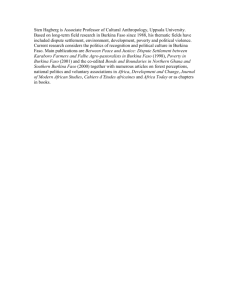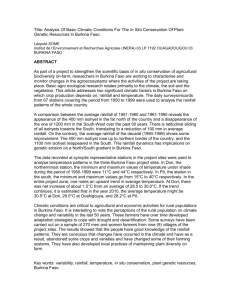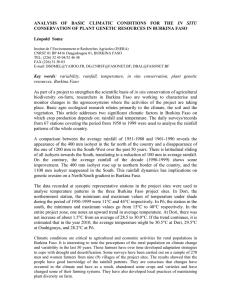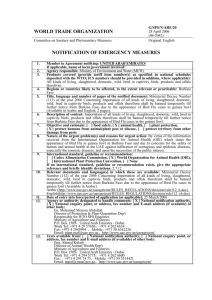The Embassy of the United ... compliments to the Ministry of ...
advertisement
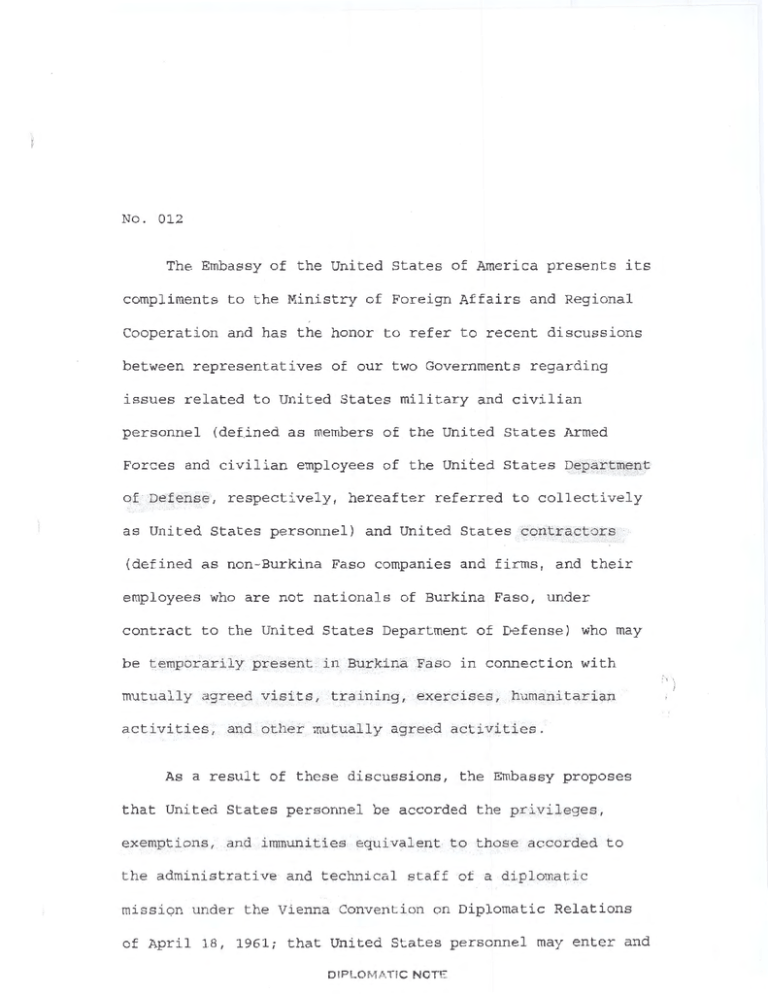
No. 012
The Embassy of the United States of America presents its
compliments to the Ministry of Foreign Affairs and Regional
Cooperation and has the honor to refer to recent discussions
between representatives of our two Governments regarding
issues related to United States military and civilian
personnel (def.ined as members of the United States Armed
Forces and civilian employees of the United States Department
of Defense, respectively, hereafter referred to collectively
as United States personnel) and United States contractors
(defined as non-Burkina Faso companies and firms, and their
employees who are not nationals of Burkina Faso, under
contract to the United States Department of Defense) who may
be temporarily present in Burkina Faso in connection with
mutually agreed visits, training, exercises, humanitarian
activities, and other mutually agreed activities.
As a result of these discussions, the Embassy proposes
that United States personnel be accorded the privileges,
exemptions, and immunities equivalent to those accorded to
the administrative and technical staff of a diplomatic
mission under the Vienna Convention on Diplomatic Relations
of April 18, 1961; that United States personnel may enter and
D IPLOMATIC NOTE
exit Burkina Faso with United States identification and with '
collective movement or individual travel orders; that Burkina
p,(af1 driu1
Faso shall accept as valid all professional licenses issued
ny
by the United States, its political subdivisions or States
thereof to United States personnel for the provision of
services to authorized personnel; and that Burkina Faso
/
authorities shall accept as valid, without a driving test or
fee, driving licenses or permits issued by the appropriate
United States authorities to United States personnel for the
operation of vehicles.
The Embassy further proposes that
United States personnel be authorized to wear uniforms while
performing official duties and to carry arms while on duty if
authorized to do so by their orders.
The Government of Burkina Faso recognizes the particular
importance of disciplinary control by United States Armed
Forces authorities over United States personnel and,
therefore, authorizes the Government of the United States to
exercise criminal jurisdiction over United States personnel
while in Burkina Faso.
~
\
-3-
The Embassy further proposes that the United States
Department of Defense and United States personnel shall not
be liable to pay any tax or similar charge assessed within
Burkina Faso and that the United States Department of Defense
and United States personnel may import into, export out of,
and use in Burkina Faso any personal property, equipment,
supplies, materiel, technology, training, or services in
connection with activities under this Agreement .
Such
importation, exportation, and use shall be exempt from any
inspection, license, other restrictions, customs dut ies,
taxes, or any other charges assessed within Burkina Faso.
The Governments of the United States of America and Burkina
Faso shall cooperate to take such measures as may be
necessary to ensure the security and protection of United
States personnel, property, equipment, records, and official
information in Burkina Faso.
The Embassy proposes that vehicles operated by or, at the
time, exclusively for the United States Department of Defense
may enter, exit, and move freely within the territory of
Burkina Faso, and that such vehicles (whether self-propelled
or towed) shall not be subject to t he payment of overland
VAl
C\
\
-4-
transit tolls.
Aircraft owned or operated by or, at the
time, exclusively for the United States Department of Defense
shall not be subject to the payment of landing, parking, or
other fees or dues at facilities owned and operated by the
Government of Burkina Faso.
Aircraft owned and operated by
or, at the time, exclusively for the United States Department
of Defense shall not be subject to payment of navigation,
overflight, terminal or similar charges when in the territory
of Burkina Faso.
The United States Department of
Defen~
shall pay reasonable charges for services requested and
received at rates no less favorable than those paid by the
Armed Forces of Burkina Faso, less taxes or similar charges.
Aircraft and vehicles of the United States Government shall
be free from boarding and inspection.
The Embassy also proposes that the United States
Department of Defense may contract for any materiel, supplies,
equipment, and services (including construction) to be
furnished or undertaken in Burkina Faso without restriction
as to choice of contractor, supplier, or person who provides
such materiel, supplies, equipment or services.
Such
contracts shall be solicited, awarded and administered in
\~
-5-
accordance with the laws and regulations of the Government of
the United States of America.
Acquisition of articles and
services in Burkina Faso by or on behalf of the United States
Department of Defense in connection with activities under
this Agreement shall not be subject to any taxes or similar
charges in Burkina Faso.
The Embassy further proposes that United States
contractors shall not be liable to pay any tax or similar
charge assessed within Burkina Faso in connection with
activities under this Agreement and that such contractors may
import into/ export out o£
1
personal property, equipment
training
1
and use in Burkina Faso any
1
supplies, materiel
1
technology/
or services in fulfillment of contracts with the
United States Department of Defense in connection with
activities under this Agreement.
exportation
1
Such importation,
and use shall be exempt from any license, other
restrictions/ customs duties/ taxes/ or any other charges
assessed within Burkina Faso.
The Embassy proposes that United States contractors shall
be granted the same treatment as United States personnel with
-6-
respect to professional and drivers, licenses.
The Embassy proposes that United States personnel shall
have freedom of movement and access to and use of mutually
agreed transportation, storage, training, and other facilities
required in connection with activities under this Agreement.
The Government of Burkina Faso recognizes that it may be
necessary for the United States Armed Forces to use the radio
spectrum.
The United States Department of Defense shall be
allowed to operate its own telecommunication systems (as
telecommunication is defined in the 1992 Constitution and
Convention of the International Telecommunication Union) .
This shall include the right to utilize such means and
services as required to ensure full ability to operate
telecommunication systems, and the right to use all necessary
radio spectrum for this purpose.
Use of the radio spectrum
shall be free of cost to the United States Government.
Further, the Embassy proposes that the Parties waive any
and all claims (other than contractual claims) against each
other for damage to, loss, or destruction of the other ' s
,{'
~' ~
.
-7-
property or injury or death to personnel of either Party's
armed forces or their civilian personnel arising out of the
performance of their official duties in connection with
activities under this Agreement.
Claims by third parties for
~
damages or loss caused by United States personnel shall be
resolved by the United States Government in accordance with
United States laws and regulations.
Finally, the Embassy proposes further that our two
governments, or their designated representatives may enter
~v~
into implementing arrangements to carry out the provisions of
this Agreement.
If the foregoing is acceptable to the Government of
Burkina Faso, the Embassy proposes that this note, together
with the Ministry's reply to that effect, shall constitute an
agreement between the two Governments, which shall enter into
force on the date of the Ministry's reply.
The Embassy of the United States of America thanks the
Ministry
of
Foreign
Affairs
and
Regional
Cooperation
Burkina Faso for its kind cooperation and avails itself of
of
-8-
this
opportunity to
renew to
the
assurances
consideration.
Embassy of the United States of America,
Ouagadougou, February 20, 2006
of
its highest
